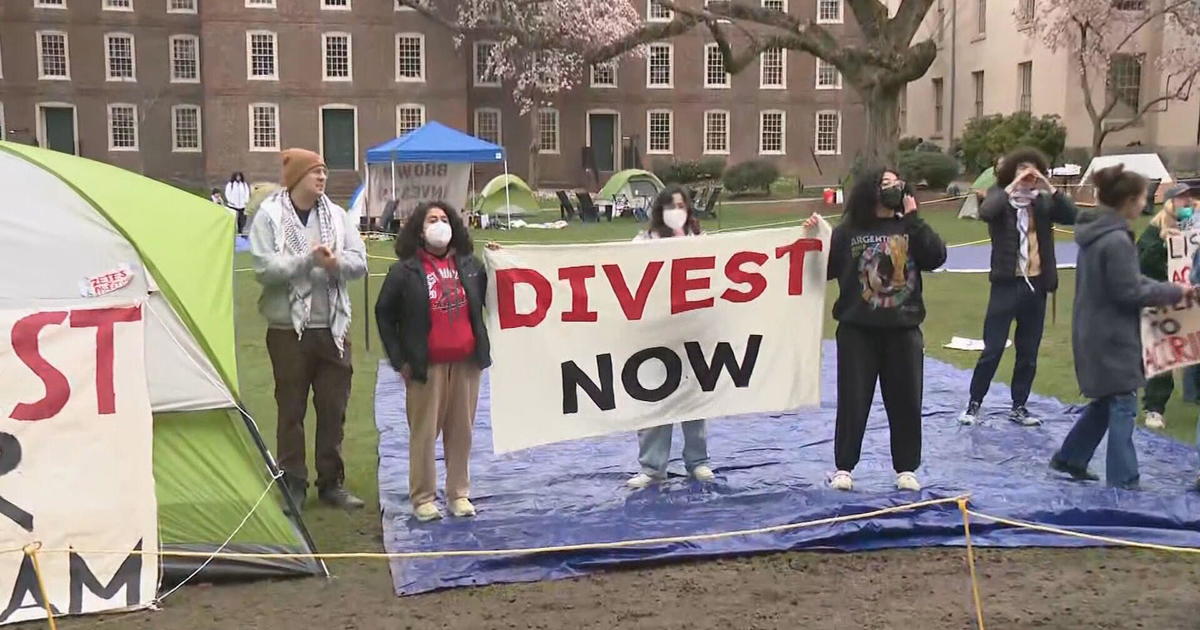CBS News
Students want their colleges to divest from Israel. Here’s what that really means.

College endowments, usually a sleepy part of a university’s operations, are now front and center at the campus protests that are spreading across the nation, with students holding up signs with slogans such as “Disclose! Divest!” and “Divest from death now!”
These demands are central to the student protesters’ efforts, with many of the students condemning what they see as their universities’ financial support of Israel’s war in Gaza. At Brown University, for example, student protesters charge that the school’s $6.6 billion endowment will remain “complicit” until it divests “from Israel and the military-industrial complex.”
The rash of demands on campus for schools to divest from Israel is throwing a spotlight on the little-known world of endowments, while also raising questions about the effectiveness of divestment as a tool to enact concrete change. To be sure, colleges aren’t strangers to calls for divestment, with student protesters in the 1980s demanding their institutions to pull money from companies doing business in apartheid South Africa. More recently, college students have pushed for their universities’ divestment from the fossil fuel industry.
But divestment often is neither a simple nor a quick process, experts say. Endowments are funded by donors, who often direct their money to be used for specific goals — such as providing scholarships for students from certain states or to fund summer study programs.
For instance, Columbia University, whose campus became a lightning rod in the pro-Palestinian protest movement, has an endowment worth $13.6 billion that is comprised of 6,200 funds.
“An endowment isn’t a monolith. They are typically comprised of many different funds, which each have different goals and purposes,” noted Todd Ely, associate professor at University of Colorado Denver’s School of Public Affairs, who is an expert on endowments. “From the perspective of endowments, the big objective is to preserve and grow the endowment,” which allows the university to fund programs, support faculty and provide student scholarships.
Ely added, “That is why it becomes so challenging — the primary objective of an endowment manager isn’t to respond to political and social pressure.”
What does “divest” mean?
“Divestment” in itself simply describes the action of selling or disposing of an investment or asset. But the term has taken on another layer of meaning as college students, activists and others have leaned on the strategy as a way to achieve political goals.
For instance, the protesters believe that by eliminating investments in businesses involved in controversial countries or industries colleges can help bring about change, such as ending apartheid, while also ensuring they reflect their students’ views on ethical issues.
The student protesters “don’t want to be part of or have their tuition dollars go to an institution that is profiting from” what they see as immense human rights abuses, noted Kelly Grotke, a founding partner of Pattern Recognition: A Research Collective, who researches and consults with students, alumni groups, faculty and others on divestment and endowments.
What are endowments, and how big are they?
Endowments are funds provided by donors to a university or college that can be earmarked for specific goals, like supporting an endowed chair for a faculty member or providing scholarships for students; or which can be used for unrestricted spending.
Endowment funds exist for perpetuity, with the university typically spending a smaller amount each year than its annual return. In that way, the endowment can continue to grow. For instance, in its most recent fiscal year, Columbia’s endowment spent about 5.2% of its funds, although its trailing 10-year return is 8%.
The current focus on college endowments is coming at a time when universities control more assets than ever before. Roughly 700 college and university endowments manage about $840 billion in assets, according to a recent study from the National Association of College and University Business Officers and the Teachers Insurance and Annuity Association of America-College Retirement Equities Fund.
While not an apples-to-apples comparison, an earlier Government Accountability Office report found that about 1,900 higher-education institutions in 2008 had a combined $400 billion in endowment holdings.
Are college endowments invested in Israel?
It’s unclear because endowments typically don’t disclose their investments; that lack of transparency has become a sticking point for many student protesters.
The calls for colleges to divest from Israel aren’t actually new, but are picking up supporters as the war in Gaza continues. The movement stems from 2005, when some Palestinian groups created an effort called boycott, divestment and sanctions (BDS) that was joined by some students and academic groups, according to Carleton University political science professor Mira Sucharov in The Conversation.
BDS has focused on divestment, as well as urging consumers to avoid buying goods or services from Israel, she noted.
Part of the difficulty in determining whether an endowment is even invested in Israel, either directly or indirectly, is the changing nature of how colleges invest their funds, Grotke said. Today, a large chunk of endowments are invested in so-called “alternative investments,” which describe strategies outside the typical mom-and-pop style of buying stocks and holding them for the long term.
Alternative investments include hedge funds, private equity firms, venture capital and other vehicles that are typically cloaked in secrecy because their managers don’t want to tip off rivals to their strategies. Typically, investors agree to invest their funds for a period of time, which can stretch for several years, making it impossible to withdraw money.
“There is so much privacy in what is being held, especially in alternative funds,” Grotke said, pointing out that much of Oberlin’s endowment is invested in alternative strategies. “If you are dealing with an index fund, you can go in and see what’s in there. You can’t do that with an alternative fund.”
Are colleges agreeing to divest?
Only one U.S. college, Evergreen State College, has agreed so far to divest. A few others, including Northwestern and Brown University, have said they will disclose their investment exposure to Israel, but even that might not provide much clarity, Grotke noted.
For instance, in the text of its deal with its pro-Palestinian protesters, Northwestern says it will “answer questions from any internal stakeholder about specific holdings, held currently or within the last quarter, to the best of its knowledge and to the extent legally possible.”
“That is language to get around disclosure,” Grotke noted. The agreement “will potentially exclude any divestment because of those contractual relationships” with alternative investment managers.
She added, “Because of the complexity of finance, they will want to look like they will cooperate, but they might not be able to.”
Northwestern didn’t immediately respond to a request for comment.
Does divestment work?
That’s up for debate, experts said.
On the one hand, the push for colleges to divest from the fossil fuel industry has “pushed a lot of new conversations in endowments about how to think about the climate change and carbon risk,” noted Georges Dyer, co-founder and executive director of the Intentional Endowments Network, which works with endowments on strategies such as low-carbon investments.
But, he added, “A big part of the debate is what impact does divestment have.”
Research on previous divestment efforts isn’t encouraging, at least in terms of whether selling assets negatively impacts the countries or companies that are targeted. For instance, one analysis of the anti-apartheid divestment push in the ’80s found that it “had little discernible effect either on the valuation of banks and corporations with South African operations or on the South African financial markets.”
But that may not be the whole point, said Grotke, noting that the anti-apartheid movement succeeded in “raising awareness of human right abuses” in South Africa. With today’s protests, the students are saying they “don’t want to live in a world in which they are implicated in” what they view as massive human rights violations.
CBS News
Norovirus outbreaks reported on 3 cruise ships this month, sickening hundreds

Hundreds of cruise passengers and workers fell ill with norovirus on three different ships this month, the Centers for Disease Control and Prevention said.
The CDC has logged outbreaks in 2024 on 14 cruise voyages, but three ships were hit in December. This is the only month this year when the CDC has reported three confirmed norovirus outbreaks on cruise ships and there’s still more than a week to go before the month ends. In all, 301 passengers and crew members fell ill during the December outbreaks, health officials said.
Those on Princess Cruises’ Ruby Princess, on a trip around Hawaii’s island, and Holland America’s Rotterdam and Zuiderdam voyages, both in the Caribbean, mostly dealt with diarrhea and vomiting.
/ Getty Images
Two Holland America cruise ships hit by norovirus
The most recent outbreak was on Holland America’s Rotterdam ship, which set sail on Dec. 8 and is set to end its Caribbean
trip Friday in Fort Lauderdale.
Officials said 83 of the 2,192 passengers on board and 12 of the 953 crew members were sickened.
“At Holland America Line, the safety and well-being of our guests and crew is our top priority. During the current voyage, a number of guests on Rotterdam reported symptoms of gastrointestinal illness,” a Holland America spokesperson said. “The cases have mostly been mild and quickly resolving.”
/ Getty Images
In response to the outbreak, there was additional cleaning and disinfection. Sick passengers and crew members were isolated. Stool specimens were collected for testing. The cruise line also consulted with the CDC’s Vessel Sanitation Program.
Once the Rotterdam ship arrives in Fort Lauderdale on Friday, it will undergo a comprehensive sanitization process before its next trip, according to the cruise line.
There was also a norovirus outbreak on Holland America’s Zuiderdam voyage earlier this month. Over the course of the Dec. 4-Dec. 11 voyage, 87 out of 1,923 passengers were reported ill, in addition to four of the 757 crew members, according to health officials.
A Holland America spokesperson declined to comment on the Zuiderdam outbreak because the voyage had already ended.
Norovirus, the “cruise ship virus”
Princess Cruises also dealt with a norovirus outbreak this month on its Ruby Princess ship during a cruise that started on Dec. 2 and ended on Wednesday. The ship started its journey in San Francisco and toured around Hawaii, according to CruiseMapper.
In all, 103 of 3,001 passengers and 12 of 1,142 crew members onboard reported being ill.
The Ruby Princess was also subject to increased cleaning and disinfection procedures, according to the CDC. Stool specimens were collected for testing and sick passengers and crew members were isolated. The cruise line consulted with the CDC’s Vessel Sanitation Program.
CBS News has reached out to Princess Cruises for comment.
There are about 2,500 reported norovirus outbreaks in the U.S. each year. Norovirus, which is sometimes called the “cruise ship virus,” causes more than 90% of diarrheal disease outbreaks on cruise ships, according to the CDC. However, norovirus outbreaks on cruise ships account for only a small percentage of all reported norovirus outbreaks.
“Norovirus can be especially challenging to control on cruise ships because of the close living quarters, shared dining areas, and rapid turnover of passengers,” according to the CDC. “When the ship docks, norovirus can be brought on board in contaminated food or water; or by passengers who were infected while ashore.”
This year, the CDC has logged outbreaks on 14 cruise voyages. Norovirus was listed as the causative agent for most of the outbreaks, though one was caused by salmonella and one was caused by E. coli. The causative agent of one outbreak remains unknown.
Norovirus outbreaks are usually more common during cooler months, typically happening from November to April in countries above the equator, according to the CDC.
CBS News
Analyzing whether the new spending bill will pass

Watch CBS News
Be the first to know
Get browser notifications for breaking news, live events, and exclusive reporting.
CBS News
What to know about the new deal to avoid a government shutdown and Trump’s influence on it

Watch CBS News
Be the first to know
Get browser notifications for breaking news, live events, and exclusive reporting.









